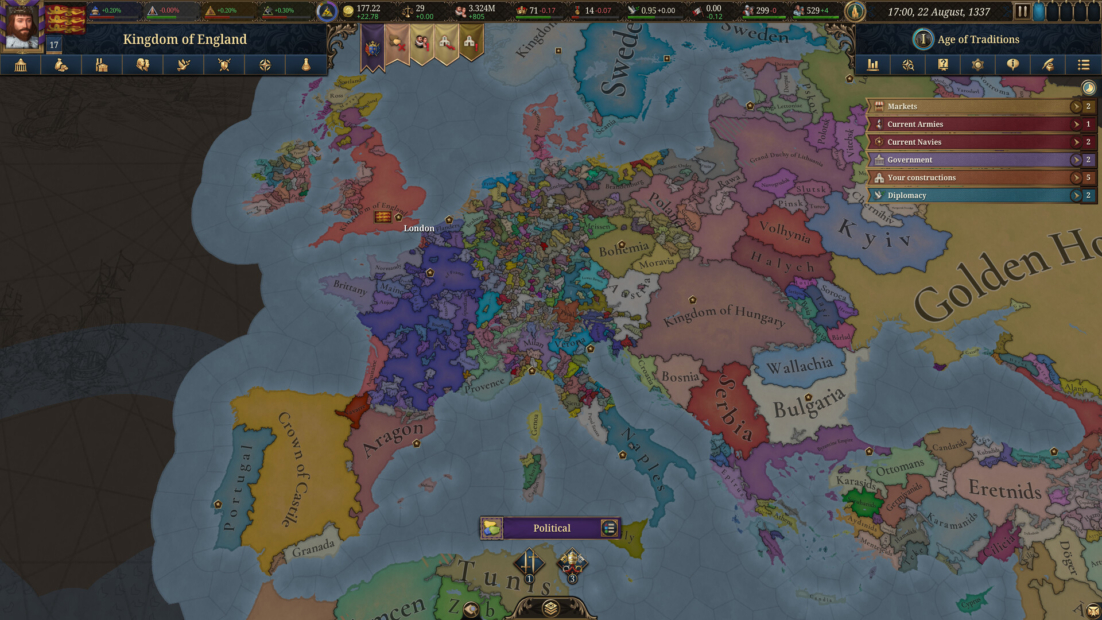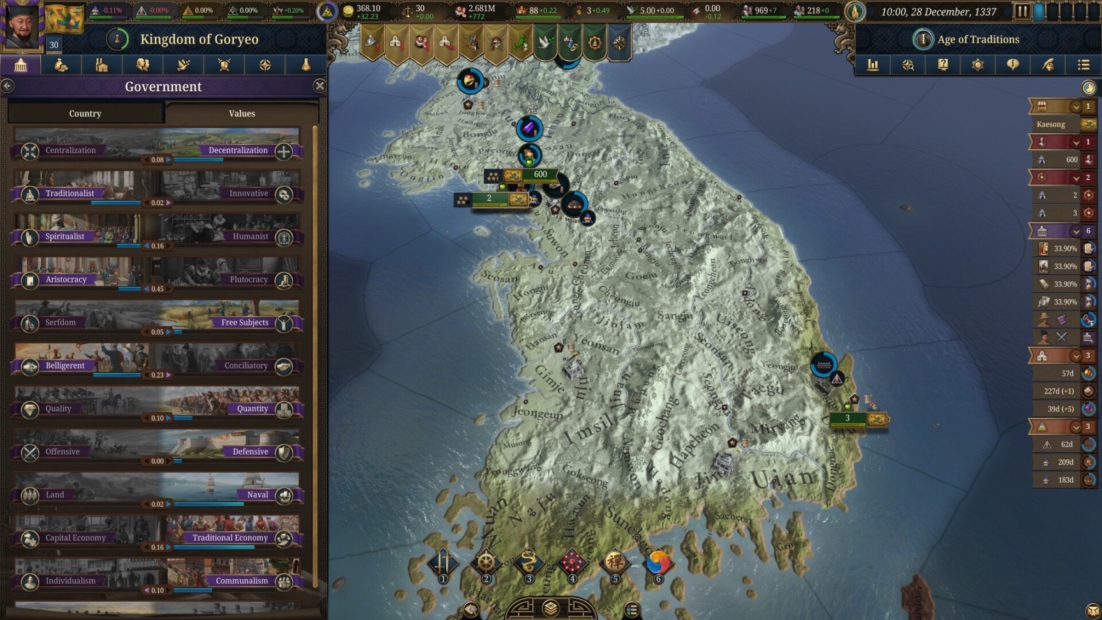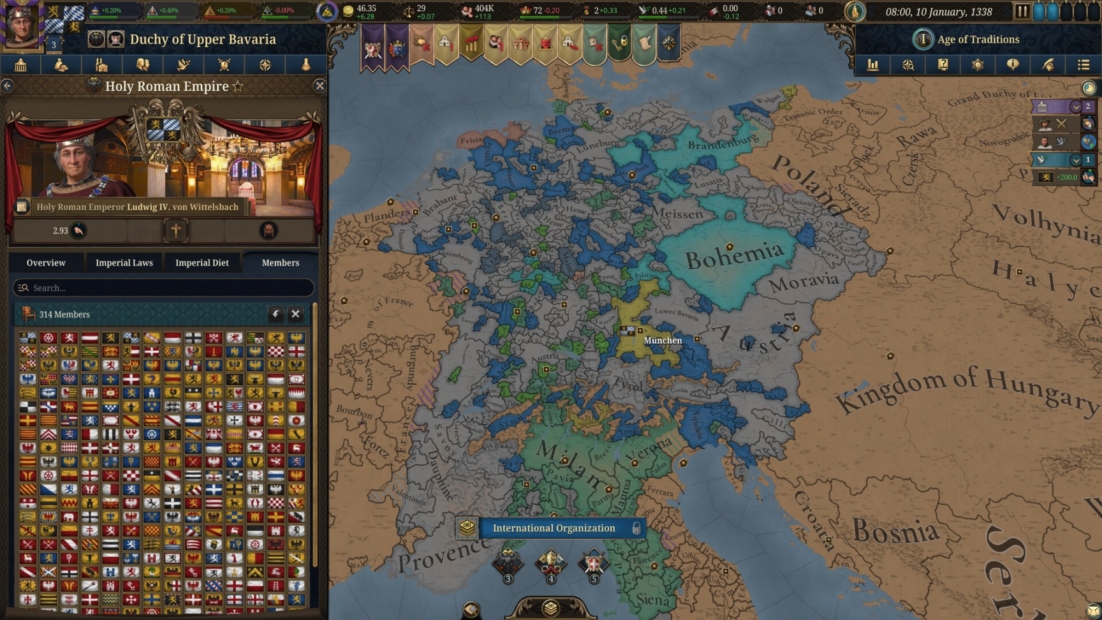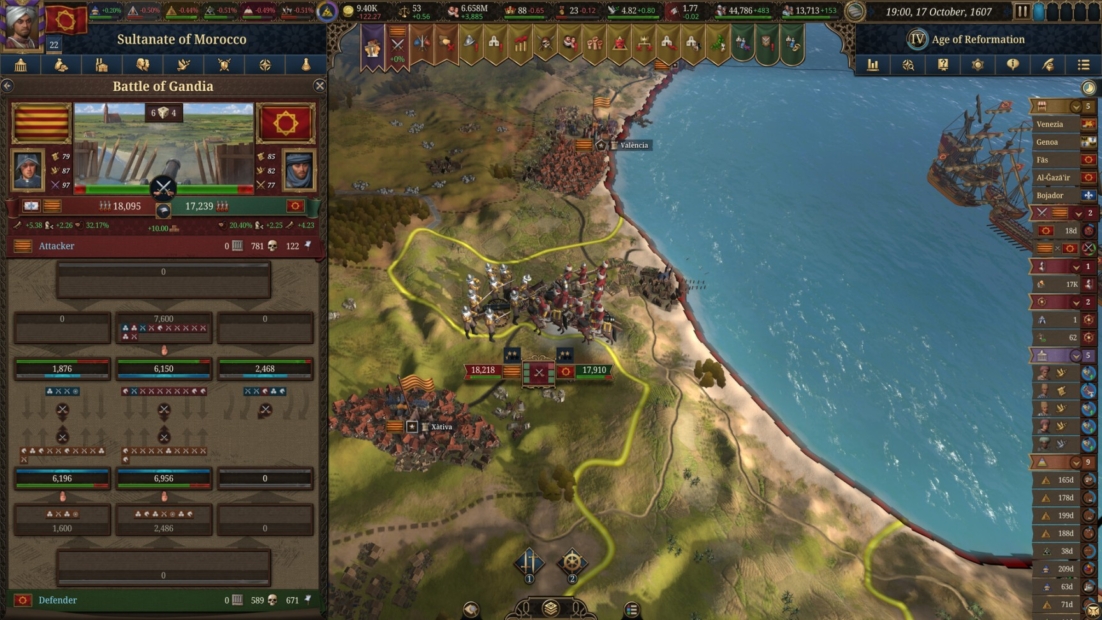With our Europa Universalis 5 politics and government guide, you’ll learn how to manage your nation’s power from the inside out. We’ll show you how different government types work, how to handle societal values, laws, and reforms, and how to use your cabinet to guide your empire through centuries of change.
Table of Contents
The Different Government Types
In Europa Universalis 5, your government influences how your entire nation operates. From passing laws to handling succession, your government type shapes your gameplay. Each has its own advantages, limitations, and unique mechanics. Let’s go over them.

Monarchy
Monarchs govern for life, and their heirs typically come from the same dynasty. However, when plans go wrong, regencies or foreign influences often cause chaos. Monarchies excel in diplomacy through royal alliances, but can quickly fall apart if succession issues arise.
Key advantages:
- Can establish royal marriages and inherit countries through personal unions.
- Uses Legitimacy as its core source of government power.
- Unlocks classic laws like Feudal “De Jure” and Royal Court Customs
Republic
If you prefer to keep things fair and stable, a Republic is the best choice in Europa Universalis 5. Rulers are elected, not born, which maintains predictable internal politics. You won’t have to deal with inheritance wars, but you’ll miss out on dynastic diplomacy. Republics focus on trade and administration, making them perfect for economic and merchant-focused gameplay.
Key advantages:
- Regular elections keep power balanced
- Uses Republican Tradition as government power
- Ideal for nations with strong Burgher estates
Theocracy
Want your nation in Europa Universalis 5 to be guided by faith? A theocracy lets religion lead the way. Your ruler serves the divine, not personal ambition, and most laws are based around the church. They’re steady and disciplined but don’t expect much flexibility in diplomacy.
Key advantages:
- Uses Devotion as government power
- Strengthens the Clergy estate power
- Great for conversion-focused gameplay
Tribe
Tribes depend on family ties and bloodlines. Power is passed through kinship and age instead of formal institutions. They might eventually develop more advanced governments, but at first, you’ll need strength and loyalty to stay in control.
Key advantages:
- Emphasizes kinship and military skill
- Offers unique estate privileges
- Can reform into a Monarchy
Steppe Horde
Steppe Hordes rely on speed, raids, and raw power. Their strength is based on might. Fail to conquer, and your unity falls apart. They can destroy cities, raid borders, and automatically take nearby lands during war. These nomadic groups are ideal for aggressive players who want to dominate through warfare.
Key advantages:
- Uses Horde Unity
- Can raze conquered provinces
- Gains loyalty through constant warfare
Societal Values
In Europa Universalis 5, Societal Values show how your nation thinks, acts, and changes. Each value exists on a scale between two opposing ideas. Your country’s position on these scales influences its laws, diplomacy, and internal stability. Over time, your choices, reforms, and estate privileges shift these values, gradually shaping your nation’s identity. Countries with similar values tend to get along better, while those on opposite ends often clash.

How to move a slider fast
- Pass a law that clearly supports one side.
- Pick cabinet members with matching traits.
- Grant an estate privilege that pushes the axis.
- Stack temporary events. Don’t waste them.
- Lock it in. Repeal the opposite privileges later.
Centralization vs Decentralization
- Centralization: increased Crown Power, reduced action range costs, stronger counterspy. You can manage more war exhaustion.
- Decentralization: happier estates, loyal subjects, lower spy risk, lower max exhaustion.
- Tip: Go Central for tall play and micro control. Go Decentral if you juggle many subjects.
Traditionalist vs Innovative
- Traditionalist: cheaper Stability, huge Cultural Tradition, but slow to embrace new stuff.
- Innovative: faster Institutions, higher Max Literacy, but Stability costs rise.
- Tip: Start Traditionalist to stabilize conquests. Slide to Innovative once your economy can pay for it.
Spiritualist vs Humanist
- Spiritualist: more clerics, faster religious conversion, slower assimilation.
- Humanist: more tolerance for heretics and heathens, faster assimilation, slower conversion.
- Tip: Many faiths inside your borders? Pick Humanist. One dominant faith and missionary ideas? Pick Spiritualist.
Aristocracy vs Plutocracy
- Aristocracy: more Discipline, more Noble power.
- Plutocracy: stronger Burghers, better Trade efficiency.
- Tip: Knights and cav buffs love Aristocracy. Trade republics and coastal empires love Plutocracy.
Serfdom vs Free Subjects
- Serfdom: more raw materials, higher supply limit, fatter Peasant taxes, more food consumption.
- Free Subjects: faster promotion, slow food use, monthly prosperity ticks.
- Tip: Early game economy can lean towards Serfdom. Shift to Free Subjects before mid-game for growth.
Belligerent vs Conciliatory
- Belligerent: cheaper war score, faster spy networks, and CB creation, but tanked Dip Rep.
- Conciliatory: better cabinet efficiency, loyal subjects, stronger Dip Rep, slower CBs.
- Tip: Switch to Conciliatory when you need coalitions to cool down after a wild expansion run.
Quality vs Quantity
- Quality: tactics, morale recovery, initiative, but higher army maintenance.
- Quantity: more frontage, lower food use, cheaper maintenance, but lower initiative.
- Tip: Rich and small. Go Quality. Wide and hungry. Go Quantity.
Offensive vs Defensive
- Offensive: more siege speed, assault power, and movement speed, but weaker fort defense.
- Defensive: fort cap and defense, combat speed, slower movement.
- Tip: Offensive breaks stalemates. Defensive drains foes in your land. Fort spam wins wars without battles.
Land vs Naval
- Land: cheaper land range, bigger RGO, sea range hurts trade.
- Naval: big Maritime presence, better sea range, land routes cost more.
- Tip: Island or trade empire? Go Naval. Continental slog? Go Land.
Capital Economy vs Traditional Economy
- Capital Economy: better production, cheaper buildings, lower bank interest, but less food.
- Traditional Economy: bigger population capacity, more raw materials and food, pricier buildings.
- Tip: High dev cities and trade goods? Choose Capital Economy. Rural resource map? Choose Traditional.
Individualism vs Communalism
- Individualism: higher army and navy morale, faster migration, and estates are less happy.
- Communalism: lower rebel join chance, easier privilege revokes, happier estates, slower migration.
- Tip: War focus likes Individualism. Internal stability and estate games like Communalism.
Outward vs Inward | starts in the Age of Discovery
- Outward: more Dip capacity, Power Projection, and colonial migration.
- Inward: more Crown Power, monthly Control, more culture tradition.
- Tip: Colonizers go Outward. Centralizers and culture stackers go Inward.
Mercantilism vs Free Trade | starts in the Age of Reformation
- Mercantilism: market protection, cheaper maintenance, tax foreign traders.
- Free Trade: more trade capacity, merchant power, and trade efficiency.
- Tip: Home node dominance loves Mercantilism. Multi-node trade empires love Free Trade.
Absolutism vs Liberalism | starts in the Age of Absolutism
- Absolutism: huge Crown Power, fewer privileges revoked, fewer rebels, and the estates are less happy.
- Liberalism: stronger Parliament, more cultural capacity, happier estates.
- Tip: Conquerors pick Absolutism. Diplomatic builders and culture unions pick Liberalism.
Unique axes
- Mysticism vs Jurisprudence: Only for Islamic, Druze, or Yazidi followers. Mysticism boosts morale and conversion. Jurisprudence enhances research and cabinet. Changing away can reset progress if you return to an eligible faith.
- Sinicized vs Unsinicized: Only within Chinese influence and parts of SEA.
Sinicized enhances administrative efficiency and research. Unsinicized improves stability, reduces costs, and preserves cultural traditions. Lose the axis and regain it. Progress resets to the middle.
The Cabinet
In Europa Universalis 5, the Cabinet is the heart of your government. Think of it as your panel of top officials who actually keep the country running while your ruler takes the credit. Every nation starts small with just two seats, but as your nation expands and reforms progress, you can grow this circle of power.
Each cabinet member has their own skills and personality, and assigning them to the right task is crucial. They can oversee the development of provinces, manage societal values, or keep your population under control. A sharp mind in administration helps your economy grow faster, while a strong military hand can suppress revolts before they spread. Your ruler’s abilities also influence how effective your cabinet is, so it pays to build a team that complements your strengths.

Eventually, you can promote a trusted member to Head of Cabinet in Europa Universalis 5. This increases your overall cabinet efficiency by 25 percent, but it is a serious commitment. Once appointed, that person can’t lead armies or be dismissed until they die. It also costs more gold and some Government Power to make it official.
Who you choose matters. A Head of Cabinet from a powerful estate will boost that estate’s Satisfaction and Power, while a loyal Crown member strengthens your central authority by increasing Crown Power and monthly Government Power gain.
As time goes on, your cabinet’s effectiveness in Europa Universalis 5 depends on your nation’s laws, culture, and progress. A well-organized government can turn even a struggling kingdom into a stable and thriving realm. Choose your advisors carefully and let them do what they excel at.
Europa Universalis 5 Politics: Laws and Reforms
In Europa Universalis 5, Laws determine how your nation functions. They cover everything from religion and the military to administration and estates. Each category has multiple laws, and each law includes policies that control its actual effects. These policies can change societal values, affect estate satisfaction, or enhance specific parts of your state.

Changing policies isn’t something to take lightly. It can cause unrest or drain your Stability, especially if your parliament or estates aren’t on board. Even after approval, new laws take time to show results. Reforming your state is a long game, not a quick fix.
Pro tips:
- Always check how a policy affects your estates before enacting it.
- Gain parliamentary support first to reduce unrest.
- Plan law changes between wars when Stability loss hurts less.
As you advance through different eras in Europa Universalis 5, new laws emerge, often improving or replacing older ones. Wise leaders plan ahead, aligning their estates and societal values before major reforms are enacted.
Government Reforms
If laws are your fine-tuning tools, government reforms are your system upgrades. They determine what kind of government you have and how it changes over the centuries.
Every nation in Europa Universalis 5 starts with unique historical reforms, such as the Beylik Reform for Anatolian states or the Feudal Nobility Reform for France, and more unlock over time through events, progress, and cultural development.

Some reforms depend on certain societal values or economic systems, for example:
- Religious Tolerance → needs a Humanist society
- Bank Ledgers → requires a Capital Economy
Major reforms overhaul your entire government in Europa Universalis 5, transforming monarchies into republics or spiritual states into secular empires. The speed of their implementation depends on your administrative efficiency, so efficient states implement reforms more quickly.
Unique cultural, religious, or event-based reforms allow you to customize your path even further. Balance ambition with patience. Implementing too many changes at once can create chaos, but consistent progress will turn your nation into a durable powerhouse.
Rule Smarter with PLITCH!
Politics in Europa Universalis 5 can be harsh. A poor reform or a drop in stability can plunge your empire into chaos. That’s where PLITCH’s Europa Universalis 5 trainer comes in. With the right codes, you can steer your nation’s future without waiting decades for reforms or risking revolts.
Boost your political stability instantly with Set Stability, strengthen your ruler’s authority by using Set Devotion/Legitimacy, or enhance your country’s reputation through Set Prestige. Need a diplomatic edge? Set Diplomats and Easy Diplomacy help you quickly win allies and maintain peace on your terms.
Head over to our Europa Universalis 5 Trainer Showcase on our YouTube channel to see our codes in action!
Happy Gaming!
Check out our other guides for the game:


